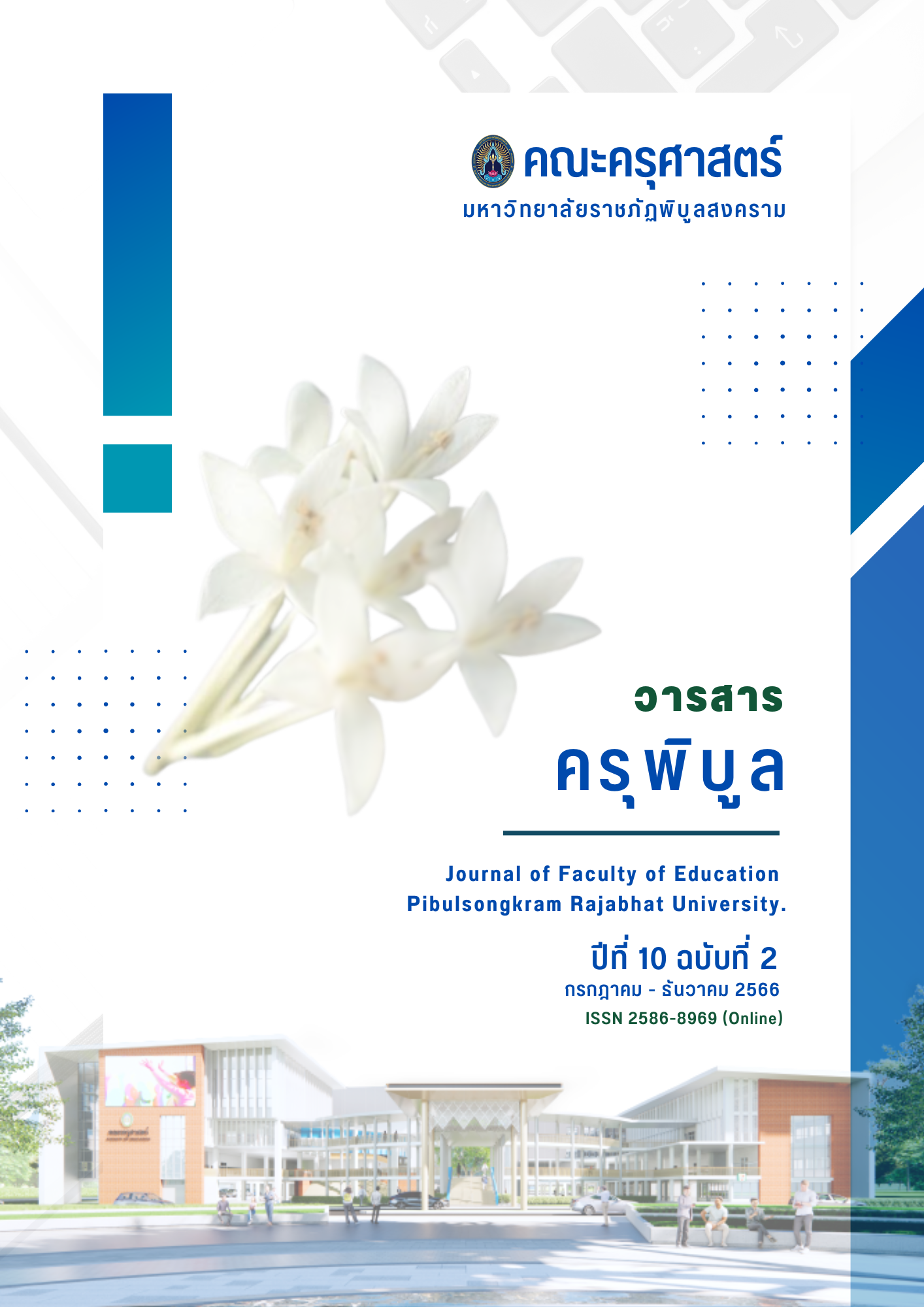DEVELOPMENT OF OUTDOOR LEARNING ACTIVITIES FOR SUBJECT ED 1101104 CURRICULUM DEVELOPMENT TO SUPPORT SCHOOL-BASED CURRICULUM DESIGN SKILLS FOR SOCIAL STUDIES STUDENTS, THEPSATRI RAJABHAT UNIVERSITY
Keywords:
Outdoor learning activities, School-based curriculum design skills, Curriculum DevelopmentAbstract
This research aimed 1) to develop outdoor learning activities; 2) to compare school curriculum design skills before and after using the outdoor learning activities; and 3) to compare school-based curriculum design skills between students using the outdoor learning activities and the control group of students. The samples were 60 of first-year social studies students who enrolled in the course ED 1101104 Curriculum Development in the academic year 1/2022. The samples were divided into 2 groups: 30 students in the experimental group and 30 students in the control group. The research instruments used in this research were outdoor learning activities, outdoor learning lesson plans, normal learning lesson plans, and an assessment form of school-based curriculum design skills. The data were analyzed by using average, standard deviation and t-test.
The results showed that:
1. Outdoor learning activities comprise six steps: 1) Plan 2) Prepare 3) Collect 4) Classify 5) Conclude and 6) Share. The content validity of the learning activities was at the highest level.
2. The students who studied using the outdoor learning activities had higher school curriculum design skills after using the outdoor learning activities at the statistically significant level of .05.
3. The students who studied using the outdoor learning activities had higher school curriculum design skills than the students who studied in the normal learning lesson plan at the statistically significant level of.05.
References
คณะกรรมการจัดทำแนวทางการปฏิรูปอุดมศึกษา. (2542). แนวทางปฏิรูปการศึกษาระดับอุดมศึกษาตามพระราชบัญญัติการศึกษาแห่งชาติ พ.ศ. 2542. สำนักงานคณะกรรมการการศึกษาแห่งชาติ.
คณะมนุษยศาสตร์และสังคมศาสตร์ มหาวิทยาลัยราชภัฏเทพสตรี. (2562). หลักสูตรครุศาสตรบัณฑิต สาขาวิชาสังคมศึกษา (4 ปี) (หลักสูตรปรับปรุง พ.ศ. 2562). คณะมนุษยศาสตร์และสังคมศาสตร์ มหาวิทยาลัยราชภัฏเทพสตรี.
ทิศนา แขมมณี. (2558). ศาสตร์การสอน : องค์ความรู้เพื่อการจัดกระบวนการเรียนรู้ที่มีประสิทธิภาพ (พิมพ์ครั้งที่ 10). สำนักพิมพ์แห่งจุฬาลงกรณ์มหาวิทยาลัย.
บุญชม ศรีสะอาด. (2546). การพัฒนาหลักสูตรและการวิจัยเกี่ยวกับหลักสูตร. สุวีริยาสาส์น.
วราภรณ์ บวรศิริ. (2541) พัฒนาการด้านการศึกษาไทยในสมัยรัชกาลที่ 9 : การอุดมศึกษาช่วงปีพุทธศักราช 2489-2539. คณะครุศาสตร์ จุฬาลงกรณNมหาวิทยาลัย.
สมศักดิ์ ภู่วิภาดาวรรธน์. (2554). การยึดผู้เรียนเป็นศูนย์กลางและการประเมินตามสภาพจริง. เชียงใหม่โรงพิมพ์แสงศิลป์.
อรนุช ลิมตศิร. (2560). การศึกษานอกห้องเรียนเพื่อเสริมสร้างทักษะการเรียนรู้ในศตวรรษที่ 21. Veridian E-Journal, Silpakorn University, 10(3), 1643-1658.
Association of Experiential Education (AEE). (2003). Definition of experiential education. www.aee.org/ndef.html.
Dowling, M. (2005). Young children’s personal, social and emotional development. Paul Chapman.
Günseli Yıldırım and Güzin Özyılmaz Akamca. (2017). The effect of outdoor learning activities on the development of preschool children. South African Journal of Education, 37(2), 1-10.
Hammerman, R. D. (1994). Teaching in outdoors. Maryland.
Priest, S. (1990). The semantics of adventure education. In Adventure education. (113-117). Venture.
Sal or, G. and Alexander, W. M. (1974). Planning Curriculum for School. Rinehart and Winston.
Sharp, L.B. (1973). Basic Consideration in outdoor and camping education. The Bulletin of The National Association of Secondary School Principals.
Downloads
Published
Issue
Section
License
Copyright (c) 2023 คณะครุศาสตร์ มหาวิทยาลัยราชภัฏพิบูลสงคราม

This work is licensed under a Creative Commons Attribution-NonCommercial-NoDerivatives 4.0 International License.
ลิขสิทธิ์เป็นของคณะครุศาสตร์ มหาวิทยาลัยราชภัฏพิบูลสงคราม


